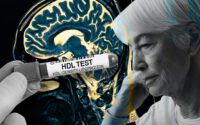Black, Hispanic Alzheimer’s patients excluded from new drug testing
New promising treatments for Alzheimer’s disease may not be as beneficial for black and Hispanic sufferers.
Leqembi and donanemab, an experimental antibody developed by Eli Lilly, are the first drugs that may slow the effects of the fatal disease as they target and attack buildup of toxic plaques of the beta-amyloid protein in the brain.
Older black Americans and Hispanics have higher rates of dementia than white people, but they were screened out of clinical testing for these medications more often, Reuters found.
Prospective black and Hispanic volunteers who displayed early symptoms didn’t have enough amyloid in their brain to qualify for the trials, 10 leading Alzheimer’s experts explained to the outlet. The issue was more pronounced for black people, five of the researchers noted.

Dr. Crystal Glover, a health equity in aging researcher at the Rush Alzheimer’s Disease Center in Chicago, wondered if the new treatments are relevant to the groups who are most at risk.
Japanese pharmaceutical company Eisai, which developed Leqembi with American partner Biogen, told Reuters it is trying to understand why 49% of black volunteers did not meet the amyloid threshold requirements for the trial, versus 22% for whites and 55% for Hispanics.
Of the 947 people enrolled in the US portion of the trial, only 4.5%, or 43, were black. Hispanics comprised 22.5%.
Outgoing Eisai senior vice president Ivan Cheung said people who are amyloid positive should get Leqembi “irrespective of race and ethnicity.”
“The drug was not designed to help specific ethnic groups or races,” he added.

Blacks and Hispanics were also excluded at somewhat higher rates for testing of Eli Lilly’s donanemab.
A Lilly spokesperson postulated to Reuters that these participants’ dementia may not be caused by Alzheimer’s or their illnesses are complicated by other factors, such as small strokes.
An estimated 6.7 million Americans 65 and older are living with Alzheimer’s, according to the Alzheimer’s Association.
Among black Americans 70 and older, 21.3% have the disease.


